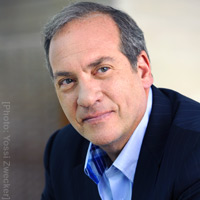Against Impossible OddsFeb 2, 2016 
Dear Friend of The Fellowship, In his book, Crusade in Europe, General Dwight David Eisenhower wrote of his first experience encountering a Nazi death camp: “The same day [April 12, 1945] I saw my first horror camp. It was near the town of Gotha. I have never felt able to describe my emotional reactions when I first came face to face with indisputable evidence of Nazi brutality and ruthless disregard of every shred of decency. Up to that time I had known about it only generally or through secondary sources. I am certain, however, that I have never at any other time experienced an equal sense of shock.” He later added, ““Of all these [Displaced Persons] the Jews were in the most deplorable condition. For years they had been beaten, starved, and tortured.” It is to Eisenhower’s credit that he felt the need not only to visit the camps to experience firsthand the horrors the Nazis inflicted on so many people, but to document those visits with film and photos, so that the world would not believe that the stories about the camps were simply propaganda. Indeed, this footage and the photos were later used by prosecutors at the Nuremberg Trials and helped to convict many war criminals. Since that time, Holocaust memorials and museums have sprung up across the world. Israel has its own Holocaust Remembrance Day (Yom HaShoah), which begins this year at sundown on May 4. And, in November 2005, the United Nations designated January 27 – the date in 1945 of the liberation of the notorious Nazi death camp at Auschwitz – as International Holocaust Remembrance Day. On January 27 I chose to think of the millions of those innocents murdered by the Nazis, and blessed their memory in prayer. I thought of those people, many of whom were Christians, who put their lives on the line so that Jewish people might live – of Oskar Schindler, of Andre and Magda Trocmé, of Corrie ten Boom, of Anne Frank, and many others. And I thought of those who survived and are still struggling not just with bitter memories, but with crippling poverty. It is these survivors that IFCJ is committed to helping, not just to survive, but to thrive, in their final years. Nothing can denigrate the memory of those who died and those who resisted, and no resolution can take away the dignity of those who lived through this terrible chapter in history. So, let us all remember those who died, those who fought evil against seemingly impossible odds, and those who miraculously survived. With prayers for shalom, peace, Rabbi Yechiel Eckstein
|
|
|


